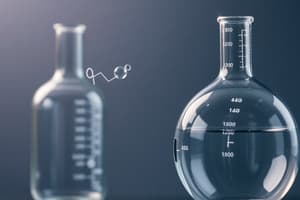Podcast
Questions and Answers
Which category of chemical reactions typically involve organic compounds found in living things?
Which category of chemical reactions typically involve organic compounds found in living things?
- Synthetic reactions
- Decomposition reactions
- Metallurgical reactions
- Organic reactions (correct)
What is the main characteristic of synthetic reactions?
What is the main characteristic of synthetic reactions?
- Involves organic compounds
- Creates new substances from existing elements (correct)
- Splits a substance into simpler parts
- Involves metals
What is a common example of a metallurgical reaction?
What is a common example of a metallurgical reaction?
- Smelting (correct)
- Dehydration
- Esterification
- Halogenation
Which type of reaction splits a substance into simpler parts?
Which type of reaction splits a substance into simpler parts?
What causes the transformation of reactants into products in chemical reactions?
What causes the transformation of reactants into products in chemical reactions?
Which type of reaction involves the melting and casting of metals?
Which type of reaction involves the melting and casting of metals?
Flashcards are hidden until you start studying
Study Notes
There are several main categories of chemical reactions, including:
-
Synthetic reactions: These create new substances from existing elements by joining or separating atoms. Common examples include combustion, halogenation, oxidation, and hydrolysis.
-
Organic reactions: These involve organic compounds, typically found in living things. Examples of organic reactions include esterification, dehydration, and open chain polycondensation.
-
Metallurgical reactions: These involve metals, particularly their melting and casting. Examples include smelting and refining ore to produce metal ingots.
-
Decomposition reactions: These split a substance into simpler parts. Examples include rusting iron, burning wood, and dissolving salt in a liquid.
In these reactions, the components, often referred to as reactants, are transformed into something else, known as the products. The change occurs because the energy levels of electrons change, causing them to move more rapidly around the nuclei or to interact differently with the nuclei themselves. Reactions can proceed in either the forward or reverse directions, depending on circumstances such as differences in energy levels.
Some reactions result in changes of state, such as liquids evaporating into gases or solids dissolving in liquids. Others cause reactions to start spontaneously, creating chemical conditions that no longer exist once the reaction starts. Still others combine substances to form complex mixtures, producing new materials with unique structural arrangements.
Studying That Suits You
Use AI to generate personalized quizzes and flashcards to suit your learning preferences.




